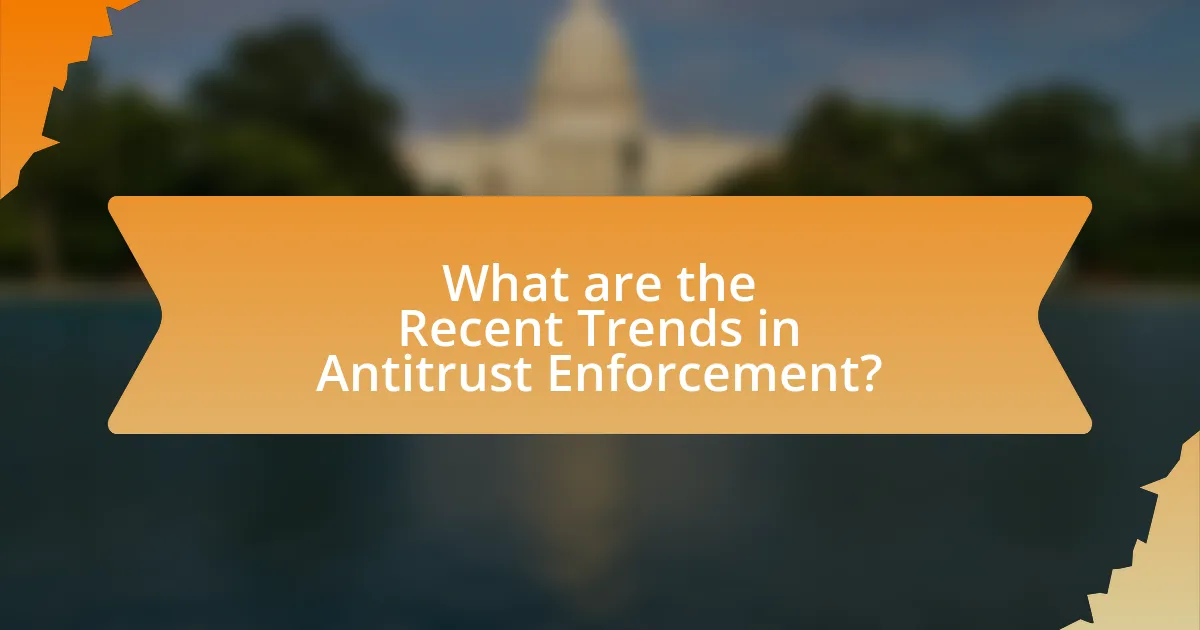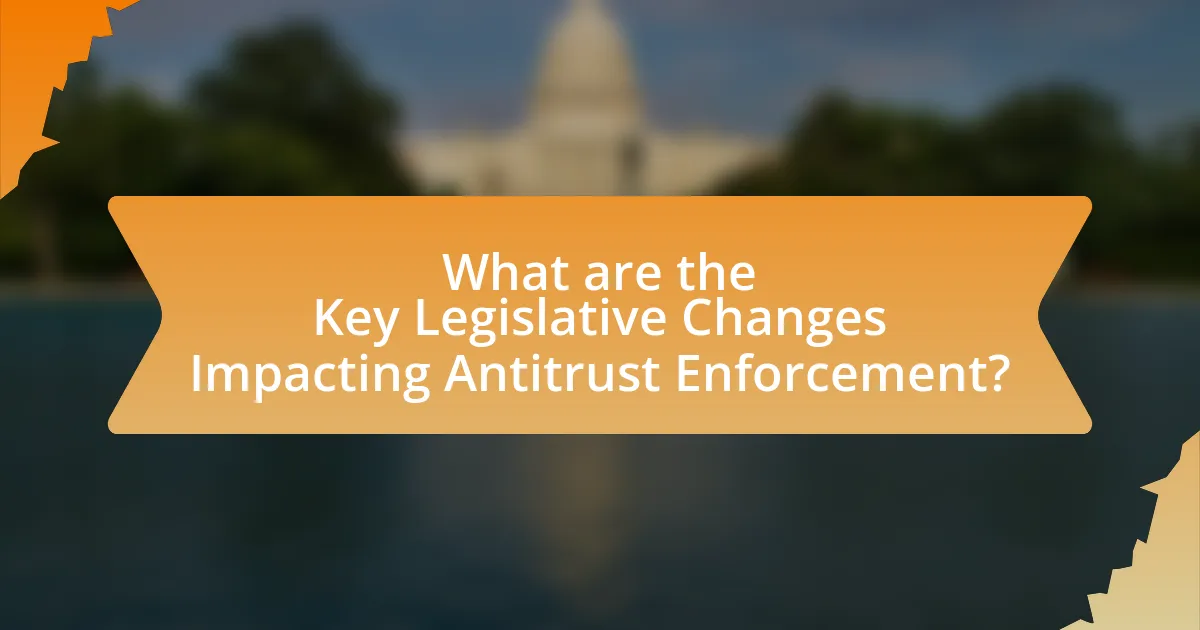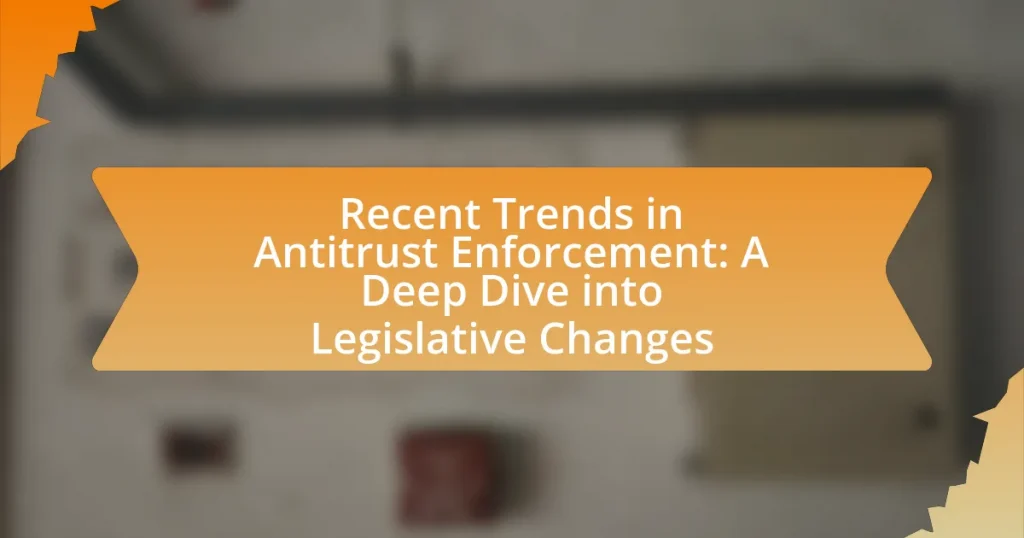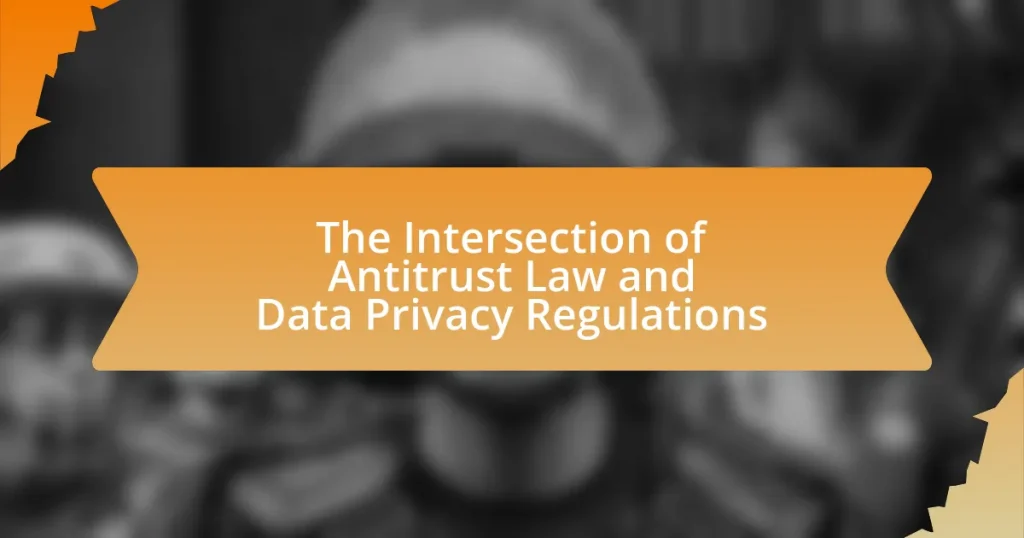The article focuses on recent trends in antitrust enforcement, particularly highlighting legislative changes that have intensified scrutiny of large technology companies. Key developments include the introduction of the American Innovation and Choice Online Act and the Competition and Antitrust Law Enforcement Reform Act, which aim to curb monopolistic practices and enhance regulatory capabilities. The article discusses how these legislative shifts reflect a bipartisan consensus on the need for stronger antitrust measures, driven by public concern over corporate power and market competition. Additionally, it examines the challenges regulators face in enforcing antitrust laws in the context of rapidly evolving digital markets and technological advancements.

What are the Recent Trends in Antitrust Enforcement?
Recent trends in antitrust enforcement indicate a shift towards more aggressive scrutiny of large technology companies and increased bipartisan support for legislative reforms. In 2021, the U.S. Congress introduced several bills aimed at curbing monopolistic practices, such as the American Innovation and Choice Online Act, which targets anti-competitive behavior by major platforms. Additionally, the Federal Trade Commission and the Department of Justice have ramped up investigations and lawsuits against companies like Google and Facebook, reflecting a renewed focus on consumer protection and market competition. This trend is supported by a growing public concern over the power of big tech and its impact on innovation and consumer choice.
How have legislative changes influenced antitrust enforcement recently?
Legislative changes have significantly influenced antitrust enforcement by introducing new frameworks and tools for regulators to address anti-competitive practices. Recent laws, such as the American Innovation and Choice Online Act, aim to curb the market power of large tech companies, enabling more rigorous scrutiny of mergers and acquisitions. Additionally, the proposed changes to the Clayton Act seek to lower the burden of proof for demonstrating anti-competitive behavior, allowing enforcement agencies to act more swiftly against monopolistic practices. These legislative shifts reflect a growing bipartisan consensus on the need for stronger antitrust measures, as evidenced by increased funding for the Federal Trade Commission and the Department of Justice to enhance their enforcement capabilities.
What specific laws have been enacted or amended in the past few years?
In the past few years, several significant laws related to antitrust enforcement have been enacted or amended, including the American Innovation and Choice Online Act and the Competition and Antitrust Law Enforcement Reform Act. The American Innovation and Choice Online Act, introduced in 2021, aims to prevent large online platforms from engaging in self-preferencing practices that harm competition. The Competition and Antitrust Law Enforcement Reform Act, also introduced in 2021, seeks to enhance the enforcement capabilities of antitrust agencies by increasing funding and resources. These legislative changes reflect a growing emphasis on addressing monopolistic behaviors and promoting fair competition in the digital marketplace.
How do these changes reflect the current economic landscape?
Recent changes in antitrust enforcement reflect a heightened focus on market competition and consumer protection in the current economic landscape. These legislative shifts, such as increased scrutiny of mergers and acquisitions, aim to address monopolistic practices that can stifle innovation and harm consumers. For instance, the Federal Trade Commission’s recent actions against major tech companies underscore a commitment to preventing anti-competitive behavior, which is crucial as digital markets continue to dominate the economy. This trend aligns with growing public concern over corporate power and its impact on prices and choices available to consumers, indicating a significant shift towards more aggressive regulatory oversight in response to evolving market dynamics.
Why is antitrust enforcement becoming more prominent in today’s market?
Antitrust enforcement is becoming more prominent in today’s market due to increasing concerns over monopolistic practices and market concentration. Regulatory bodies are responding to the growing dominance of large technology companies, which has raised alarms about reduced competition and consumer choice. For instance, the U.S. Department of Justice and the Federal Trade Commission have initiated several high-profile investigations and lawsuits against major firms like Google and Facebook, citing violations of antitrust laws. These actions reflect a broader shift in policy aimed at curbing anti-competitive behavior and promoting fair market practices, as evidenced by the introduction of new legislative proposals aimed at strengthening antitrust regulations.
What factors are driving increased scrutiny of monopolistic practices?
Increased scrutiny of monopolistic practices is driven by heightened public awareness, legislative changes, and the rise of digital platforms. Public awareness has grown due to media coverage of corporate behavior, leading to demands for accountability. Legislative changes, such as the introduction of new antitrust bills in the U.S. Congress, aim to strengthen enforcement against anti-competitive practices. Additionally, the dominance of digital platforms like Amazon and Google has raised concerns about market control and consumer choice, prompting regulators to take a closer look at their practices. These factors collectively contribute to a more rigorous examination of monopolistic behavior in various industries.
How does public opinion shape antitrust enforcement trends?
Public opinion significantly influences antitrust enforcement trends by shaping policymakers’ perceptions and priorities. When the public expresses concern over monopolistic practices or corporate power, it prompts government agencies to take a more aggressive stance on antitrust issues. For instance, the rise of populist sentiment in the United States has led to increased scrutiny of large tech companies, resulting in heightened enforcement actions by the Federal Trade Commission and the Department of Justice. This shift is evidenced by the surge in antitrust lawsuits against major corporations, reflecting a growing public demand for fair competition and accountability.
What challenges do regulators face in enforcing antitrust laws?
Regulators face significant challenges in enforcing antitrust laws, primarily due to the complexity of modern markets and the rapid pace of technological innovation. The increasing prevalence of digital platforms complicates the identification of anti-competitive behavior, as traditional metrics for market dominance may not apply. For instance, in the tech industry, companies like Google and Amazon operate in ways that can obscure their market power, making it difficult for regulators to assess anti-competitive practices accurately. Additionally, the global nature of many corporations means that enforcement can be hindered by jurisdictional issues, as different countries may have varying antitrust laws and enforcement mechanisms. This complexity is compounded by the need for substantial resources and expertise to investigate and litigate cases effectively, which can strain regulatory agencies.
How do technological advancements complicate antitrust enforcement?
Technological advancements complicate antitrust enforcement by creating rapidly evolving markets that challenge traditional regulatory frameworks. The emergence of digital platforms and algorithms can lead to anti-competitive behaviors that are difficult to detect and analyze, as seen in cases involving data monopolies and network effects. For instance, the dominance of companies like Google and Amazon illustrates how technology can enable firms to engage in practices that stifle competition while operating within legal gray areas. Additionally, the speed of innovation often outpaces the ability of regulators to adapt existing laws, making it challenging to apply antitrust principles effectively. This complexity is further exacerbated by the global nature of technology companies, which complicates jurisdictional issues in enforcement.
What role do international regulations play in domestic antitrust cases?
International regulations significantly influence domestic antitrust cases by providing frameworks that guide national enforcement actions. These regulations, such as those established by the World Trade Organization and the Organisation for Economic Co-operation and Development, promote consistency in competition laws across borders, which helps prevent anti-competitive practices that can affect international trade. For instance, countries often align their antitrust policies with international standards to facilitate cooperation in investigations and enforcement, as seen in cases involving multinational corporations. This alignment not only enhances the effectiveness of domestic antitrust actions but also ensures that domestic markets remain competitive in a global context.

What are the Key Legislative Changes Impacting Antitrust Enforcement?
Key legislative changes impacting antitrust enforcement include the introduction of the American Innovation and Choice Online Act and the Competition and Antitrust Law Enforcement Reform Act. These laws aim to enhance scrutiny of large tech companies and promote competition by prohibiting anti-competitive practices. For instance, the American Innovation and Choice Online Act specifically targets practices that disadvantage competing products or services, while the Competition and Antitrust Law Enforcement Reform Act seeks to strengthen the enforcement capabilities of antitrust agencies. These changes reflect a growing bipartisan consensus on the need for more robust antitrust measures to address market concentration and protect consumer interests.
Which recent legislative acts have had the most significant impact?
The recent legislative acts that have had the most significant impact on antitrust enforcement include the American Innovation and Choice Online Act and the Competition and Antitrust Law Enforcement Reform Act. These acts aim to enhance competition in digital markets and strengthen antitrust laws. The American Innovation and Choice Online Act seeks to prevent dominant platforms from engaging in self-preferencing practices, while the Competition and Antitrust Law Enforcement Reform Act proposes to increase funding for antitrust enforcement agencies and streamline the merger review process. Both acts reflect a growing bipartisan consensus on the need to address monopolistic behaviors in the tech industry, as evidenced by increasing scrutiny of major tech companies like Google and Amazon.
What are the main provisions of these acts?
The main provisions of recent antitrust acts include enhanced scrutiny of mergers and acquisitions, increased penalties for anti-competitive practices, and expanded authority for regulatory agencies to investigate and challenge monopolistic behavior. These provisions aim to promote competition and prevent market dominance by a few entities, thereby protecting consumer interests and fostering innovation. For instance, the proposed legislation emphasizes the need for pre-merger notification and review processes, which require companies to disclose potential anti-competitive impacts before completing transactions.
How do these provisions change the enforcement landscape?
These provisions significantly enhance the enforcement landscape by introducing stricter penalties and expanding the scope of antitrust regulations. The new legislative changes empower regulatory bodies to impose higher fines on companies engaging in anti-competitive practices, thereby increasing deterrence. For instance, the introduction of treble damages allows courts to triple the amount of damages awarded to plaintiffs in antitrust cases, which has been shown to incentivize private litigation and strengthen enforcement efforts. Additionally, the provisions facilitate greater collaboration between international regulatory agencies, improving the ability to tackle cross-border anti-competitive behavior effectively. This collaborative approach is evidenced by recent agreements between the U.S. and European Union to share information and coordinate investigations, thereby creating a more unified enforcement strategy.
How have state-level initiatives influenced federal antitrust policies?
State-level initiatives have significantly influenced federal antitrust policies by prompting a reevaluation of enforcement strategies and regulatory frameworks. For instance, states like California and New York have enacted stricter antitrust laws, which have led to increased scrutiny of large corporations and tech companies. This state-level activism has pressured federal agencies, such as the Federal Trade Commission and the Department of Justice, to adopt more aggressive stances on antitrust enforcement, as seen in the heightened investigations into major tech firms like Google and Facebook. Additionally, the collaboration between state attorneys general in multi-state lawsuits against corporations has demonstrated a unified approach that compels federal regulators to align their policies with state-level concerns, thereby shaping the overall landscape of antitrust enforcement in the United States.
What examples exist of state laws leading to federal changes?
State laws have led to federal changes in various instances, notably in antitrust enforcement. For example, California’s Consumer Privacy Act (CCPA) prompted the federal government to consider comprehensive data privacy legislation, as states began to adopt their own privacy laws, highlighting the need for a unified federal standard. Additionally, the Massachusetts law mandating health insurance coverage for all residents influenced the federal Affordable Care Act, which aimed to expand healthcare access nationwide. These state-level initiatives demonstrate how localized legal frameworks can catalyze broader federal legislative responses.
How do state and federal laws interact in antitrust cases?
State and federal laws interact in antitrust cases through a framework where both levels of government can enforce competition laws, often leading to complementary but distinct legal actions. Federal antitrust laws, primarily the Sherman Act and the Clayton Act, set baseline standards for competition, while state laws can impose stricter regulations or provide additional remedies. For instance, states can pursue cases against anti-competitive practices that may not be addressed at the federal level, as seen in cases like California’s enforcement of its own antitrust statutes. This interaction allows for a more robust enforcement landscape, where state attorneys general can collaborate with federal agencies like the Federal Trade Commission to address anti-competitive behavior effectively.
What are the implications of proposed antitrust legislation?
Proposed antitrust legislation aims to enhance competition and curb monopolistic practices, which could lead to significant changes in market dynamics. These implications include increased scrutiny of mergers and acquisitions, potentially resulting in more blocked deals that could consolidate market power. For instance, the Federal Trade Commission has indicated a willingness to challenge large mergers that may harm competition, as seen in the recent opposition to the merger between Nvidia and Arm. Additionally, the legislation may impose stricter regulations on dominant tech companies, fostering a more competitive environment that benefits consumers through lower prices and improved services. Historical data shows that stronger antitrust enforcement can lead to a more diverse marketplace, as evidenced by the breakup of AT&T in the 1980s, which resulted in increased innovation and consumer choice.
What potential changes are being discussed in Congress?
Congress is discussing potential changes to antitrust laws aimed at increasing regulatory scrutiny on large technology companies. Proposed legislation includes measures to enhance the enforcement capabilities of the Federal Trade Commission and the Department of Justice, allowing for more aggressive actions against anti-competitive practices. Specific bills, such as the American Innovation and Choice Online Act, seek to prohibit dominant platforms from favoring their own products over competitors, reflecting a growing bipartisan consensus on the need for reform in response to market concentration and consumer protection concerns.
How might these proposals affect businesses and consumers?
These proposals may lead to increased regulatory scrutiny for businesses, potentially resulting in higher compliance costs and operational adjustments. For instance, stricter antitrust laws could limit mergers and acquisitions, impacting market competition and innovation. Consumers might benefit from enhanced competition, leading to lower prices and improved product quality. Historical data shows that increased competition often correlates with better consumer outcomes, as seen in markets where antitrust actions have successfully dismantled monopolistic practices.

What are the Future Directions for Antitrust Enforcement?
Future directions for antitrust enforcement include a focus on digital markets, increased scrutiny of mergers and acquisitions, and a shift towards more aggressive regulatory approaches. Regulatory bodies, such as the Federal Trade Commission and the Department of Justice in the United States, are prioritizing the examination of monopolistic practices in technology firms, as evidenced by recent high-profile cases against companies like Google and Facebook. Additionally, legislative changes, such as the proposed American Innovation and Choice Online Act, aim to prevent large platforms from engaging in self-preferencing and anti-competitive behavior. These trends indicate a significant evolution in antitrust enforcement, emphasizing the need for updated frameworks to address the complexities of modern markets.
How might antitrust enforcement evolve in the next few years?
Antitrust enforcement is likely to evolve towards more aggressive scrutiny of mergers and acquisitions, particularly in the technology sector. Recent legislative changes, such as the introduction of the American Innovation and Choice Online Act, indicate a shift towards preventing anti-competitive practices by large tech companies. Additionally, the Federal Trade Commission and the Department of Justice have signaled intentions to increase investigations and litigation against companies perceived to engage in monopolistic behavior, as evidenced by high-profile cases against Google and Facebook. This trend reflects a broader bipartisan consensus on the need for stronger antitrust measures to promote competition and protect consumers.
What trends are emerging in global antitrust enforcement?
Emerging trends in global antitrust enforcement include increased scrutiny of digital markets, a focus on consumer welfare, and enhanced international cooperation among regulatory bodies. Regulatory authorities are particularly targeting large technology companies, implementing stricter regulations to address monopolistic practices and data privacy concerns. For instance, the European Union has introduced the Digital Markets Act, which aims to ensure fair competition in the digital sector. Additionally, countries like the United States are seeing a resurgence in antitrust litigation, with agencies like the Federal Trade Commission actively pursuing cases against major corporations. This shift reflects a growing recognition of the need to adapt antitrust frameworks to the complexities of modern economies and technological advancements.
How could technological innovations reshape antitrust strategies?
Technological innovations could reshape antitrust strategies by enabling more sophisticated data analysis and monitoring of market behaviors. Advanced algorithms and machine learning can identify anti-competitive practices more effectively than traditional methods, allowing regulators to respond swiftly to emerging threats. For instance, the use of big data analytics can reveal patterns of consumer behavior and pricing strategies that may indicate collusion or monopolistic practices. This shift towards data-driven enforcement is supported by the increasing complexity of digital markets, where traditional antitrust frameworks may struggle to keep pace. As a result, regulators are likely to adopt more proactive and adaptive strategies that leverage technology to ensure fair competition.
What best practices should businesses adopt in light of these trends?
Businesses should adopt proactive compliance strategies to navigate recent trends in antitrust enforcement effectively. This includes conducting regular audits of business practices to ensure alignment with evolving regulations, as the Federal Trade Commission has increased scrutiny on mergers and acquisitions, evidenced by a 50% rise in merger challenges in 2021 compared to previous years. Additionally, companies should invest in training programs for employees to foster a culture of compliance and awareness regarding antitrust laws, which can mitigate risks associated with potential violations. Engaging legal counsel for ongoing advice on regulatory changes is also crucial, as this can provide businesses with tailored strategies to adapt to the shifting landscape of antitrust enforcement.
How can companies ensure compliance with evolving antitrust laws?
Companies can ensure compliance with evolving antitrust laws by implementing robust compliance programs that include regular training, monitoring, and legal audits. These programs should be designed to adapt to changes in legislation and enforcement practices, which have become increasingly dynamic in recent years. For instance, the Federal Trade Commission and the Department of Justice have intensified scrutiny on mergers and acquisitions, as evidenced by the significant increase in merger challenges in 2021, where the agencies blocked or sought to block several high-profile deals. By staying informed about these trends and engaging legal experts to interpret new regulations, companies can proactively adjust their practices to mitigate risks associated with antitrust violations.
What strategies can businesses implement to mitigate antitrust risks?
Businesses can mitigate antitrust risks by implementing comprehensive compliance programs that include regular training, monitoring, and audits. These programs should educate employees about antitrust laws and the importance of fair competition, thereby reducing the likelihood of violations. Additionally, businesses can conduct antitrust risk assessments to identify potential vulnerabilities in their practices, allowing them to proactively address issues before they escalate.
Moreover, establishing clear communication channels for reporting antitrust concerns can foster a culture of compliance. Companies should also seek legal counsel to review business practices and agreements to ensure they align with current antitrust regulations. According to the Federal Trade Commission, companies that adopt such proactive measures are less likely to face enforcement actions or penalties, reinforcing the effectiveness of these strategies in mitigating antitrust risks.
What resources are available for understanding antitrust enforcement?
Resources available for understanding antitrust enforcement include government websites, academic publications, and legal databases. The Federal Trade Commission (FTC) and the Department of Justice (DOJ) provide comprehensive guidelines, case studies, and enforcement actions on their official websites, which serve as primary sources for current antitrust laws and regulations. Academic journals such as the Antitrust Law Journal publish peer-reviewed articles that analyze trends and case law, offering insights into enforcement practices. Additionally, legal databases like Westlaw and LexisNexis contain extensive archives of case law, statutes, and legal commentary, facilitating in-depth research on antitrust issues. These resources collectively provide a robust framework for understanding the complexities of antitrust enforcement.
Where can businesses find guidance on navigating antitrust issues?
Businesses can find guidance on navigating antitrust issues through resources provided by government agencies such as the Federal Trade Commission (FTC) and the Department of Justice (DOJ). These agencies offer detailed guidelines, policy statements, and educational materials that outline antitrust laws and enforcement practices. For instance, the FTC’s “Antitrust Guidelines for Collaborations Among Competitors” and the DOJ’s “Antitrust Division Policy Guide to Merger Remedies” serve as essential references for understanding compliance and best practices in antitrust matters.
What role do legal experts play in advising on antitrust matters?
Legal experts play a crucial role in advising on antitrust matters by providing guidance on compliance with competition laws and regulations. They analyze business practices to identify potential antitrust risks, ensuring that companies avoid anti-competitive behavior that could lead to legal penalties. Legal experts also assist in the interpretation of complex antitrust legislation, such as the Sherman Act and the Clayton Act, which govern competitive practices in the United States. Their expertise is essential in conducting due diligence during mergers and acquisitions to assess the competitive implications and advise on necessary regulatory filings. Furthermore, legal experts represent clients in investigations and litigation related to antitrust claims, leveraging their knowledge of case law and regulatory precedents to build effective defense strategies.



